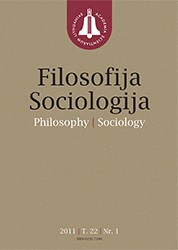Kognityvinė sąmonė I. Kanto patyrimo teorijoje
Cognitive Consciousness in Kant’s Theory of Experience
Author(s): Edvardas RimkusSubject(s): Metaphysics, Epistemology, German Idealism
Published by: Lietuvos mokslų akademijos leidykla
Keywords: cognition; consciousness; experience; Kant; intellectual intuition; outer experience; inner experience;
Summary/Abstract: The article investigates the Kantian theory of cognitive consciousness not only as epistemological but also as psychological theory of human consciousness. Kant describes experience as a synthesis of sensible matter and conceptual form. Transcendental consciousness, producing basic conceptual instruments of cognition and acting both in the spheres of outer and inner experience, lying on the ground of this process. There is a social aspect in this theory of cognitive consciousness that Kant himself has never expressed directly: a priori concepts and principles/rules of cognition are produced and legitimated not only by separate individuals but also intersubjectively in a social community. Treating transcendental consciousness psychologically as a theory analysing mechanisms that establish individual consciousness, intellectual intuition (which is refused in Kant’s theory) needs to be introduced.
Journal: Filosofija. Sociologija
- Issue Year: 30/2019
- Issue No: 3
- Page Range: 192-198
- Page Count: 7
- Language: Lithuanian

